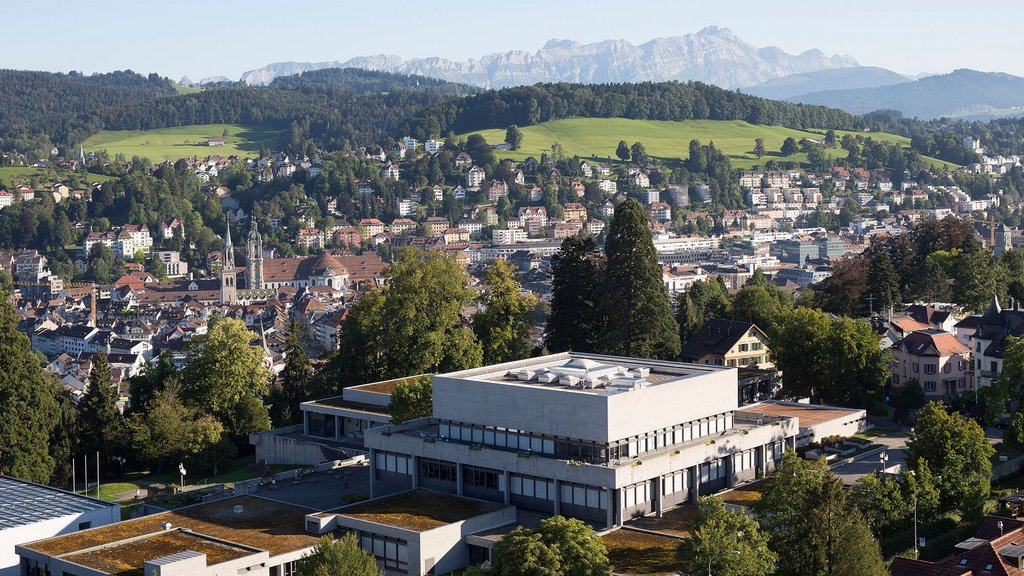Campus - 27.05.2021 - 00:00
Regional impact of the HSG: value creation of CHF 276.5m in the canton
The University of St.Gallen (HSG) has calculated its regional impact for the seventh time. In 2019, its value creation for the canton amounted to CHF 276.5m. Thus the HSG generates more than five francs in added value from each franc that it receives from the cantonal taxpayers. In addition to the monetary impact, the University makes a wide variety of contributions to the region’s attraction as a place to live and do business in.

27 May 2021. The study entitled "Regional Impact of the University of St.Gallen 2019" calculates the University of St.Gallen’s impact on the Canton of St.Gallen in detail. Its value creation of CHF 276.5m was approx. 40 million higher than in 2017. The reasons for this are the continuing growth of the HSG, but also adaptations of the measuring methods. Cantonal Finance Minister Marc Mächler is pleased by the findings of the study: "The monetary effects are very gratifying for the Canton of St.Gallen. They clearly show that the HSG is of eminently important economic significance for the whole of Eastern Switzerland." The HSG funds about half of its budget itself. This is more than is the case with all the other Swiss universities and the Federal Institutes of Technology.
Local businesses profit from direct purchasing power effects
The lion’s share of the monetary impact is constituted by the purchasing power effects of the University itself (CHF 68.5m) and its students (CHF 127.2m) who live, eat, shop, etc. in the canton. Local businesses thus strongly profit from the HSG and its activities. For instance, 15 per cent of all overnight stays in the City of St.Gallen are accounted for by activities of the HSG (particularly executive education and events). Since the figures refer to 2019 and thus to the time before the outbreak of the pandemic, the influences of the latter are not reflected in the study yet.
Qualified employees for the regional labour market
Besides monetary effects, the HSG contributes to the attraction of the region in a wide variety of other ways, as the Cantonal Minister of Economic Affairs, Beat Tinner, confirms: "The University of St.Gallen makes a substantial contribution to the regional labour market, for example as an employer with more than 3,000 employees. Indirectly, it is its graduates who are in great demand as specialists in the private sector and in public administration. In the long term, its contribution as a research partner for trade and industry is of particular importance, for instance with regard to the Innovation Park East."
In order to obtain an HSG degree, young people move into the canton and are available to the labour market as qualified employees. This is the case for part-time jobs or internships, but particularly after they have completed their studies. The extent to which the HSG satisfies regional needs through the courses it offers is relevant, as is the question as to whether its graduates remain in the region to work. In accordance with regional requirements, the HSG launched the Joint Medical Master in cooperation with the University of Zurich and further partners in 2020, as well as establishing the School of Computer Science in keeping with the IT education offensive.
Start-up and development of companies on site
HSG graduates are in demand on the labour market. An increasing number of them, however, also start up companies, an activity that the University encourages in cooperation with partners. Start-ups are important for the innovation and dynamism of the (regional) economy. Of the 144 start-ups which bore the spin-off label of the University of St.Gallen in 2019, 28 are based in the Canton of St.Gallen. All of them reported an increase in the number of jobs in 2019. Finally, the HSG’s various job offers, research into regional issues and/or with regional partners, as well as its events and executive education courses, contribute to the qualification of regional employees and the development of locally based firms.
Important contribution to cantonal goals
In the context of the study, the contribution made by the University to the cantonal goals defined in the 2017-2027 priority plans was determined for the first time. Thanks to its many-faceted activities, the HSG supports the political aims of the canton not only in obvious areas such as innovative education and research, but also in other areas, such as sustainable infrastructure (e.g. HSG Learning Center, Platztor campus, Innovation Park East) and holistic health promotion (School of Medicine, Joint Medical Master). Impact in keeping with the cantonal goals is also generated by activities which reinforce the cantonal knowledge system (research into regional issues, the open-access platform Alexandria, direct transfer of knowledge between institutes, centers and regional partners, the Children’s University and public lecture courses) and the image of the region (location marketing, worldwide media presence). Stefan Kölliker, Cantonal Education Minister and Chairman of the University’s Board of Governors, sums up: "The University of St.Gallen is an international lighthouse ‘up on the hill’, but not only that: increasingly, it is also coming ‘down into the valley’, to the population. In this way, it creates new top-class specialists and brings new life to the city and the region."
Background of the study
The survey of the HSG’s regional impact was conducted for the seventh time. For the first time, the study was methodologically adapted to the Business School Impact Survey (BSIS) of the international university accreditation organisation EFMD. In addition, the spatial frame of reference was extended to include the Canton of St.Gallen in order to take into account the HSG’s ownership structure. Since the HSG creates the best part of its added value in the agglomeration of the City of St.Gallen, which includes municipalities of the Canton of Appenzell Ausserrhoden, a small amount of blurring cannot be ruled out. The region of Eastern Switzerland and the international Lake Constance region are the HSG’s extended area of impact.
More articles from the same category
Discover our special topics











